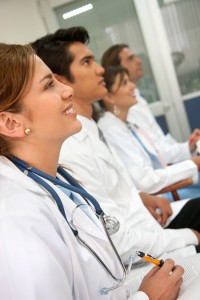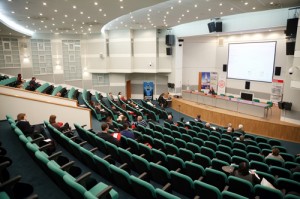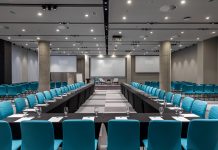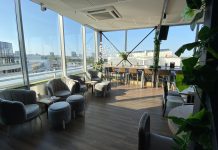We can look at several alternative segments of the overall demand for all types of events. For instance, the market can be segmented by size in small and large meetings; or by purpose of the meeting in education, incentive, information meetings, etc.
Still, the demand is most often segmented by buyer.
It is known that corporate sector, covering private businesses of all sizes, dominates by a huge number of meetings and conventions necessary for their effective operation and for sustaining their competitive market positions.
Public medical and healthcare sector and corporate pharmaceutical and medical sector rank among top three sectors globally by size and number of organized specialist meetings of all types, and by attendance as well.
All events may be divided into internal and external. Internal events are organized within institutes, healthcare centres and companies for their employees and they are normally smaller-scope meetings, trainings or management seminars or Board meetings, etc.
External meetings are aimed at interacting with the company’s external partners or associates. Such meetings can be organized for a new  product presentation (e.g. a drug) and attended by the company’s dealers and distributors or in a specific case, by physicians, pharmacists, representatives of healthcare and other institutions; or they can be annual meetings or jubilees of pharmaceutical companies or healthcare institutions, attended by their shareholders and other interested parties.
product presentation (e.g. a drug) and attended by the company’s dealers and distributors or in a specific case, by physicians, pharmacists, representatives of healthcare and other institutions; or they can be annual meetings or jubilees of pharmaceutical companies or healthcare institutions, attended by their shareholders and other interested parties.
External meetings also include regional or international specialist conferences and congresses, aimed at exchange of experience, acquiring new knowledge, presenting own results, gaining new contacts and nurturing the existing ones. Such meetings can cover several hundred participants.
The core reason for organizing specialist conferences, seminars, etc. which are attended by medical and healthcare professionals is the necessary continuing education not only for ethical, responsible and professional work attitude, but also for issuing and renewing the work licence.
According to the Rulebook on Conditions for Issuing, Renewing and Repealing the Licence for the Members of the Healthcare Professionals’ Chambers in the Republic of Serbia, Article 8 “a healthcare professional may renew the licence if during the licence term such professional has gained 168 points in the course of continuing education, and every year 24 points through the contents of the continuing education programme pertinent to the professional activity they perform, and for which such licence is issued or renewed.”
“A total of 24 points shall be attained out of several different continuing education programmes. One half of the annual total points (12 points) shall be earned within the continuing education programme conducted in the healthcare institution or private practice employing the healthcare professional. The other half of points shall be earned by participating in external continuing education programmes conducted outside the healthcare institution or private practice at the national or international level.”
In Serbia, there have been Continuing Medical Education Centres set up, which organize specialist seminars, accredited by the Serbian Healthcare Council and worth a certain number of points necessary for obtaining and renewing the licences.
The activity of these centres is continuing education, specialist and scientific improvement for healthcare professionals and healthcare associates; retraining and additional training for healthcare professionals; healthcare awareness; additional student education; other educational activities pertaining to the development of healthcare and medical science.
It is the necessity of continuing education that represents one of the reasons for such high number of meetings and high attendance by healthcare professionals at the specialist seminars and conferences in the region all year round in all healthcare, medical, and pharmaceutical segments.
In the second half of 2010,  there has been research conducted among the pharmaceutical companies and healthcare institutions in the SEE region in order to examine the significance and share of the sector in the regional MICE.
there has been research conducted among the pharmaceutical companies and healthcare institutions in the SEE region in order to examine the significance and share of the sector in the regional MICE.
The survey results show that the organization of and attendance at specialist seminars is most important in the business of each and every pharmaceutical and healthcare institution involved in the research. Exchange of experience with experts in certain fields, and a positive PR in corporate social responsibility are most important according to Medical Marketing Manager of the company Alkaloid AD – Skopje, Mr Dimitar Stojmenovski.
Also, acquiring new knowledge, presenting own results, gaining new contacts and nurturing the existing ones, and incentives for future performance are all very important reasons for organizing and attending specialist seminars, as emphasised by the Institute for Blood Transfusion of Serbia.
“Specialist seminars are especially important if the seminar/conference topic addresses the therapeutic fields of the company’s business”, states Dr Marko Sekulić with the company Novo Nordisk Pharma d.o.o. Beograd.
80% of the respondent pharmaceutical companies practices team building for their employees as well as incentive travel 2-3 times per year. They find it most important for the business, but the financial crisis has in many cases lowered the number of and opportunities to organize team building or incentive travel, so it is often the case that a meeting which has to be organized for employees is arranged in an unusual and interesting place to get at least a tad of the team building effect and incite the employees to socialize. Due to financial circumstances, the public healthcare institutions and associations seldom organize team building travels, but they make up for it through socializing in the events organized on important occasions.
Congresses and symposiums at the national level with international attendance are organized once a year, or every two or four years, depending on the professional association.
When it comes to pharmaceutical companies, corporate level events are organized 4-6 times per year, while locally numerous smaller presentations/meetings, depending on the country of business, are organized 15-25 times a year.
From Abbott Labolatories d.o.o., Slovenia, say that presentations in hospitals and health centers are held once a week, and seminars and conferences are organized in the spring and autumn (professional conferences for doctors, with presence of their representatives along with doctors).
Corporate events and larger-sized congresses are planned one to two years ahead, and the organization of smaller meetings is planned 2-8 months beforehand.
Asked what was most important for them when selecting a venue, space, and agency to organize the event, they answered mostly as follows according to the priority: reliability, efficiency, experience, recommendation, response time, flexibility, ambience, accommodation quality, top equipment and conference room, socializing area, professional technical staff, accessibility of the venue to the guests arriving and depending on the purpose, that is, the nature of the event itself, catering, adequate capacities, and then price.
Mr Dimitar Stojmenovski with Alkaloid AD – Skopje also adds: ”Our Company has business standards in place for event organization and venue. We always set clear goals and share our expectations with our partners who organize the event.”
Pharmaceutical companies and healthcare institutions and associations organize most their meetings in the country of their representative office. It can also be interpreted as part of their corporate social responsibility (CSR) that they as companies promote the country where they do business, contributing that way to the country’s development.
Lately, there has been a rise in the percentage of organized meetings in the neighbouring countries versus the country of the representative office within the SEE region. The venues explicitly mentioned were: Belgrade, Zlatibor, Ohrid, Palić, Zagreb, Rovinj, Ljubljana, Portorož, Piran, Budva, Novi Sad, Kopaonik, Sarajevo, Dojran, Mavrovo, Bitola, Strumica, Vršac.
Future trends at education of sales forces at the pharma industry
Sales training is changing from a one-off event to a strategic year-round campaign.
There will be a whole new way of looking at sales training that reaches far beyond an annual sales conference. Company will tend to provide live events, virtual events to provide content and training, post-meeting activities to reinforce the training communication campaigns, and learning and development programs to its corporate clients.
Instead of relying on a large sales force to get the message out about their products, companies will moving toward smaller sales teams composed of highly trained specialty representatives. Companies will rely less on samples and more on education and that smaller, highly skilled sales forces to promote drugs. The result: a greater need for educational meetings to train sales reps as well as to bring thought leaders together to discuss these products.
The economy is changing, and the pharma industry is changing dramatically along with it. Many companies are reducing their sales force; they don’t have as many products to sell as drugs come off of patent protection. They are also facing with concerns such as cost containment and what to do if their product is not on the first of a hospital’s formulary of approved drugs — issues beyond the features and benefits of a particular product.
The state of the economy also has caused cutting of the length of sales meetings. Where they once have had five days, they now are looking at a two-and-a-half-day event. This means that meetings should be more focused and streamlined at the live event, with taking care what can be rolled out before the event, and what can be done post-meeting on a virtual campus.
As the industry adapts its approach to product development and sales and marketing, meeting professionals can expect to see an increase in pharma companies collaborating with payers on the types of products they develop, multiple smaller product launches taking the place of large launches, more smaller pharmaceutical companies bringing drugs to market, and increased development of highly specialized and targeted pharmaceuticals, driving a need for more training meetings for physicians and sales forces.




































 Srpski
Srpski English
English